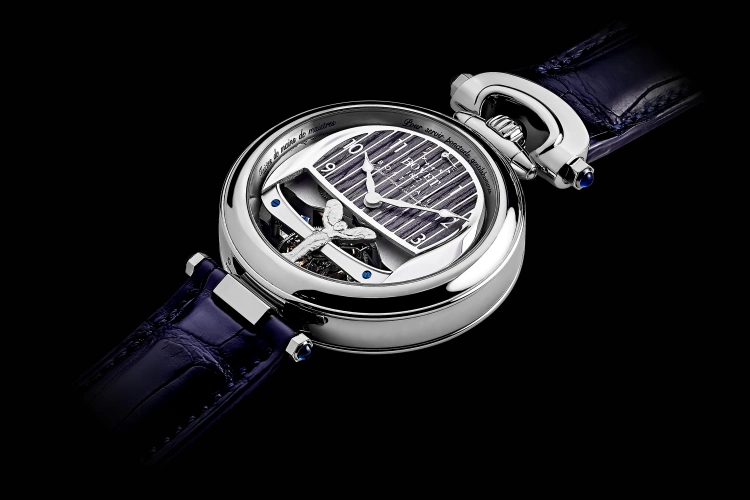The Rolls-Royce Boat Tail Timepiece by Bovet 1822
Rolls-Royce collaborates with Swiss master horologists BOVET 1822 to create unique timepieces for the first Boat Tail coachbuilt commission.
 Photo by Rolls-Royce/Bovet 1822
Photo by Rolls-Royce/Bovet 1822
The clock in a Rolls-Royce motor car frequently assumes a jewel-like status, often becoming a canvas for the client to tell the story of their commission in miniature. For Rolls-Royce Boat Tail, the recently unveiled, first of three, coachbuilt creations, in which every element has been created to the owners' exact specifications, this iconic centerpiece has been elevated to new technical and aesthetic heights.
In a spirit of warm collaboration, Rolls-Royce Motor Cars and Swiss master watchmakers, BOVET 1822, have created a pair of unique timepieces for Boat Tail and its owners. This ambitious undertaking brought together designers, engineers, and craftspeople from both luxury Houses, in a magnificent demonstration of their shared values of excellence, precision, heritage, artistry, innovation, and attention to detail.
The timepieces are unique to both the horological and automotive worlds. Made as a pair - in lady's and gentleman's versions - they are reversible, and housed in BOVET 1822's patented Amadeo case, which allows them to be worn on the wrist, or used as a table clock, pendant, or pocket-watch, as well as being placed front and center in Boat Tail's fascia as the motor car's own timepiece. Both are fitted with tourbillon mechanisms to ensure perfect accuracy.
BOVET 1822 initially earned its reputation making luxury pocket-watches for wealthy patrons in China; today, it is renowned worldwide for its exquisite timepieces featuring hand-painted dials, detailed engraving, and finely finished visible mechanisms.
The timepieces, created for this first iteration of Boat Tail, have specially designed 18K white gold cases and feature matching front dials with the same Caleidolegno veneer found on the aft deck of Boat Tail itself, and are finished with the owner couples names. The gentleman's timepiece is highly polished; the lady is ornately engraved then filled with blue lacquer.
On the reverse side, the dials are more individual. The gentleman features an aventurine dial with the celestial arrangement of the night sky over the place of his birth on his birth date; the lady is decorated with an ornate miniature painting of a flower bouquet on a mother-of-pearl dial. This design is a traditional BOVET 1822 motif, chosen by and personalized for the owner.
Both reverse dials have hand-engraved Bespoke sculptures of Boat Tail, complete with wheels, door handle, mirrors, and other fine details. By working closely together, the teams at Rolls-Royce and BOVET 1822 were able to achieve a precise color match between the lacquer on this tiny work of art and the full-size motor car.
Further close cooperation was required to ensure the timepieces conformed to the demands of their unique role as motor car clocks. In watchmaking, weight is rarely an issue for a complex timepiece, but in this instance, there was a limit on the combined permissible weight of the timepieces and their holders. BOVET 1822 met this requirement by creating an entirely new 44mm white gold case. In addition, the timepieces and holders also had to be tested to automotive-industry standards for vibration and crash safety - something never previously undertaken on mechanisms of this kind.
At a conservative estimate, the timepieces' design, engineering, sculptures, miniature painting, marquetry, bespoke movements, and cases took a total of 3,000 hours to complete.
The Transformative Tourbillon
When a pocket watch is left static in one position for any length of time, the effect of gravity on key moving parts can impair its accuracy. At the end of the 18th Century, watchmakers solved this problem by developing the tourbillon, where the escapement and balance wheel are mounted in a cage that slowly revolves, canceling out the gravitational effect. In a wristwatch, the wearer's natural physical movements diminish the need for the tourbillon. However, when that same timepiece is mounted vertically in a car dashboard for many hours at a time, the tourbillon truly comes into its own.
BOVET 1822 is a specialist in tourbillion timepieces, for which it holds a number of patents and has received many awards including the Aiguille d'Or, watchmaking's highest honor. It is also one of the only companies in the watch industry to manufacture its own spirals and regulating organs. To reduce potential impact from the vibration from the car, the tourbillon has pivots rather than the traditional ball bearings; a heavier balance wheel, and an increased oscillation rate to aid precision. Finally, the tourbillon bridge is finished with a miniaturized Spirit of Ecstasy handcrafted in gold.
The timepieces have an astonishing five-day power reserve, rather than the 42-48 hours of a 'standard' watch, to allow for their role as motor car clocks.
Dashboard Holder Mechanism: Perfect Precision
The holder mechanism is unique to Rolls-Royce Boat Tail and was designed by BOVET 1822 engineers and the Rolls-Royce Coachbuild design team from a blank sheet of paper. Although in a Rolls-Royce vibration is naturally reduced to an absolute minimum - undetectable vibrations are inevitably still present. This highly complex mounting assembly serves to isolate the timepieces from these micro-vibrations. It also ensures they operate silently, are easy to mount and remove from the dashboard, and, above all, remain safe and secure.
These challenges were unlike any normally encountered in watchmaking and car manufacture. From the start, BOVET 1822 was determined to follow a purely mechanical approach in keeping with its tradition of Swiss handcrafted production. The engineers' innovative solution was to keep all the system's moving parts external, with the dashboard providing a solid setting for the holder. Finally, Rolls-Royce ensured that when the holder is not housing one of the timepieces, it can be covered with a beautiful engraved and lacquered display plaque. Below the clock, the dashboard is fitted with a special drawer, lined with the same leather as Boat Tail's seats, which serves as a safekeeping receptacle to house the timepieces, straps, chain, and pendant when not in use.






















